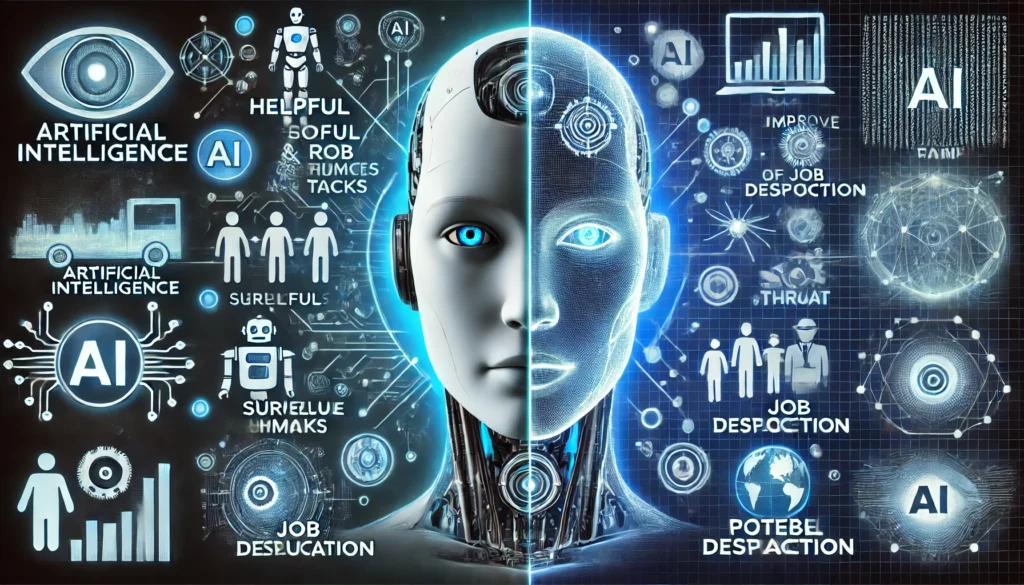
Artificial Intelligence(AI): Boon or Bane for the Future?
Artificial Intelligence (AI) has become an inseparable part of our daily lives. Whether it’s using voice assistants, getting movie recommendations, or even automating tasks at work, AI is making its way into everything. But with this rapid advancement, many questions arise—Will AI replace human jobs? Can AI think like humans? Will AI take over everything? Let’s break it down in a simple and engaging way.
Can AI Replace Human Beings?
No. AI can assist humans but cannot fully replace them. The biggest difference between AI and humans is that AI lacks emotions, creativity, and independent thinking. While AI can handle repetitive tasks, humans are needed for decision-making, emotional intelligence, and ethical considerations. Instead of seeing AI as a competitor, think of it as a partner that helps in reducing workload so that humans can focus on more complex and creative aspects of work.
Will AI Take Away All Jobs?
AI will replace some jobs, but it will also create new ones. Routine and repetitive jobs may be taken over by AI, but creative, managerial, and technical roles will still require human intelligence. Those who upskill and adapt to AI-driven changes will have better job opportunities. The real challenge is not job loss but job transformation.
What If AI Replaces All Jobs? How Will Humans Earn?
It is impossible for AI to replace every job. Even if AI does most of the work, new job roles will emerge, such as AI maintenance, programming, and ethical monitoring. If AI reaches a level where it can do everything, then economies will evolve accordingly—perhaps through universal basic income or new economic models where humans focus more on innovation and creativity.
Can AI Learn to Take Care of Itself?
Not entirely. AI can be programmed to self-learn and improve, but it will always need human intervention for maintenance, upgrades, and ethical supervision. Movies may show robots taking care of themselves, but in reality, AI needs regular checks to ensure it functions correctly and aligns with human values.
How Can AI Improve My Daily Life and Career?
AI is already making life easier in many ways:
Personal Assistants: Siri, Alexa, and Google Assistant help with daily tasks.
Healthcare: AI-powered diagnostics can detect diseases faster than doctors.
Finance: AI helps in fraud detection, stock predictions, and expense management.
Education: AI-powered learning platforms personalize education based on students’ abilities.
Career Growth: AI-driven tools assist in job matching, skill enhancement, and productivity improvement.
Will AI Replace Human Creativity and Intuition?
No. AI can generate content, art, and music, but it lacks true creativity and intuition. Human experiences, emotions, and cultural understanding contribute to creativity, which AI cannot replicate fully. AI can assist creatives, but it won’t replace them.
What Are the Biggest Flaws in AI?
AI is powerful but not perfect. Some major flaws include:
Bias: AI models learn from data, and if the data is biased, AI will be biased too.
Lack of Understanding: AI can process information but does not “understand” like humans.
Dependence on Data: AI cannot function without large amounts of data.
Ethical Concerns: AI raises concerns about privacy, surveillance, and job displacement.
How Will AI Change the Job Market in the Next 15 Years?
AI will reshape industries, making some jobs obsolete while creating new ones. Fields like automation, cybersecurity, AI ethics, and robotics will see job growth. Companies will prefer employees who have AI-related skills, making continuous learning essential for career growth.
How Can Engineering Students Prepare for an AI-Driven Future?
Students should focus on:
Learning AI & Machine Learning: Understanding the basics of AI programming.
Developing Problem-Solving Skills: AI needs human oversight for real-world application.
Ethical AI Understanding: Knowing the ethical implications of AI development.
Interdisciplinary Knowledge: AI is used in healthcare, finance, and other fields, so diverse knowledge will be beneficial.
Can AI Think Like Humans or Will It Always Need Human Control?
AI can simulate human-like responses but cannot truly think or feel. AI follows patterns and algorithms, while human thinking is influenced by emotions, experiences, and consciousness. AI will always need human control to ensure ethical and responsible usage.
How Is AI Treating You?
This is an interesting question! If you use AI wisely, it treats you well—helping with tasks, simplifying processes, and saving time. But if you misuse or fear it, it may seem threatening. Like any technology, AI is a tool, and how we use it determines its impact.
What Real-World Problems Can AI Solve?
AI has the potential to solve many global challenges:
Healthcare: AI can detect diseases early, assist in surgeries, and analyze medical reports.
Environment: AI helps in predicting climate changes, optimizing energy use, and reducing waste.
Agriculture: AI-powered tools assist farmers in crop monitoring and yield prediction.
Disaster Management: AI can predict earthquakes, floods, and other natural disasters to prevent damage.
Conclusion: The Future of AI
AI is here to stay, but it is not something to be afraid of. It is a tool that, when used responsibly, can enhance human life. Instead of worrying about AI taking over, focus on how you can use AI to your advantage. Adapt, learn, and grow with AI—it’s a journey, not a competition.
AI is not about replacing humans; it’s about making human lives better. The future is not AI vs. Humans, but AI + Humans!
source: https://www.jigneshacademy.in.net/artificial-intelligence-boon-or-bane-for-the-future/
Nanotechnology! Best AI Tool designs molecules. This Best AI Tool simulates chemical interactions at atomic level!